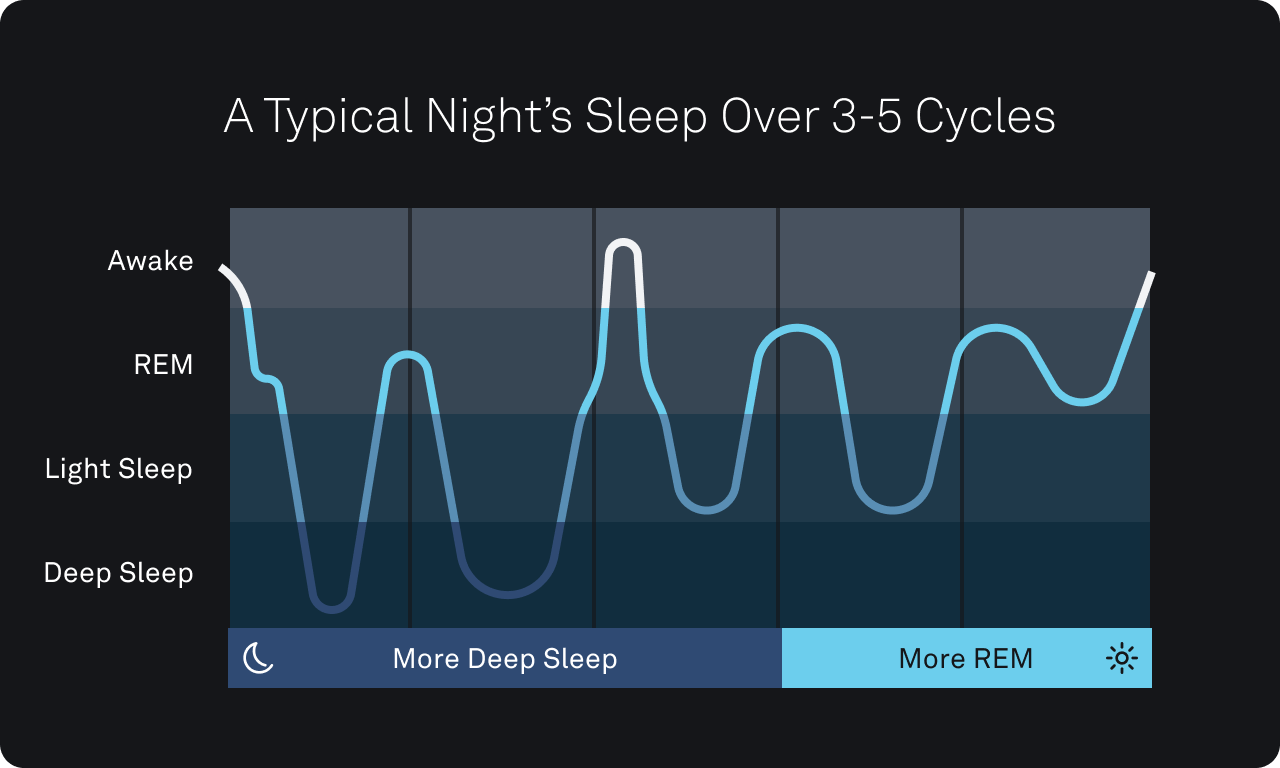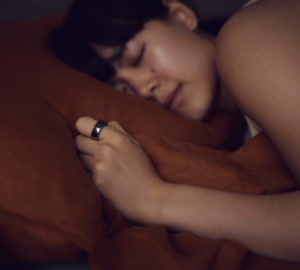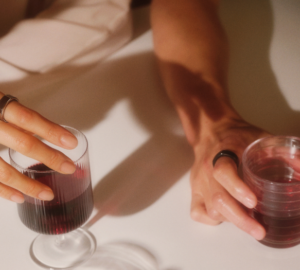- Certain herbs and supplements can be used as natural sleep aids, and their efficacy has been supported in research.
- The best herb or supplement for you depends on what’s causing your poor sleep, and your current state of health. That’s why speaking to a medical provider before starting is always best.
- You can use Oura to log your herb or supplement use to see how it affects your sleep and health markers.
Tired of tossing and turning all night? Science suggests certain herbs and supplements can help you drift off to dreamland more easily — and stay asleep for longer.
Note: “When it comes to herbs and supplements, what works well for one person won’t work for another,” says Lily Holmberg, a trained herbalist and content manager at Oura. “People are extremely individualistic in how their bodies react to sleep support from herbs and supplements.”
If you’re an Oura member, use features like Tags and Trends to help you understand what works for you. “After all, nothing is one-size-fits-all when it comes to health and wellness — especially sleep,” Holmberg notes.
READ MORE: Why Am I Tired but Can’t Sleep
3 Supplements for Better Sleep
Melatonin
Melatonin, also referred to as the sleep hormone, plays a crucial role in regulating sleep. Typically, melatonin levels rise in the evening to signal that it’s time for sleep, and are low in the morning, promoting wakefulness. This natural cycle in melatonin reflects your body’s circadian rhythm. When melatonin levels are low when they’re meant to be high – you’ll struggle to fall asleep.
Melatonin insufficiency is linked to insomnia and other sleep disorders and symptoms, ranging from restlessness to waking up during the night. You can also suppress melatonin by being exposed to light in the evening – like watching TV!
LEARN MORE: Everything You Need to Know About Melatonin
What the science says: Melatonin is one of the most studied sleep supplements! A systematic review evaluated 23 randomized controlled trials, concluding that it improves sleep quality and can be used to treat sleep disorders.
However, it’s important to mention that melatonin should only be used as and when needed, continuous use can have side effects.
| Member Tip: Log your melatonin use on the Oura App using Tags to make sure you’re not overdoing it. |
How to take: Melatonin typically comes in a one to five milligram dose, in the form of capsules or gummies. Take these 30 minutes to one hour before bedtime. You can also get more melatonin through food. For example, two cups of tart cherry juice is the equivalent to over three grams of melatonin.
Magnesium
Magnesium is an essential mineral that plays a vital role in over 300 biochemical reactions in the body, including the synthesis of melatonin. You can get magnesium from food, like dark chocolate or chia seeds, or through supplementation.
This wonder mineral helps to activate the parasympathetic nervous system, aka the “rest-and-digest” system. When this state is activated, key neurotransmitters involved with sleep and relaxation are released, like acetylcholine. This reduces arousal and induces calmness, playing a vital role in regulating the circadian rhythm.
READ MORE: Managing Stress: The Mind Body Connection
What the science says: A clinical trial gave older adults 500 mg of magnesium for eight weeks and evaluated their sleep. The researchers found magnesium increased sleep duration, efficiency, and melatonin and decreased latency and cortisol levels. A win across the board!
How to take: Magnesium glycinate and magnesium threonate are considered effective types of magnesium for sleep, with a starting dose of around 200 milligrams per day, taken 30 minutes before bedtime.
L-Theanine
This amino acid is a naturally occurring sleep aid. It can be found in tea leaves or through direct supplementation.
What the science says: Studies have shown L-theanine can help you fall asleep more quickly and improve the quality of your sleep. Instead of acting as a sedative, L-theanine works by combating the stress and anxiety associated with sleep disturbances. Plus, it has many other potential benefits that go beyond improving your sleep: It can promote relaxation without causing drowsiness, making it a good choice for daytime stress-busting.
How to take: L-theanine is commonly consumed in a capsule, which you can find at your local health food store or online. Follow dosage recommendations as per the product label.
| Member Tip: Simplify your bedtime routine with a supplement that contains all three of these ingredients, such as Deep Sleep by Genuine Health. Made with melatonin, magnesium, and L-theanine, this combination can help you fall asleep quicker and wake up feeling refreshed. Oura members receive 20% off Genuine Health products using code GHOura20.* |
6 Herbs for Better Sleep
For centuries, traditional medicine practices have used herbs for an array of conditions, including improving sleep. By harnessing the power of herbs, you can tap into nature’s pharmacy.
Chamomile
Chamomile is a nervine herb that contains several bioactive compounds, including flavonoids, terpenoids, and antioxidants. Nervine herbs work to relax the central nervous system, and when combined with specific compounds like apigenin, a flavonoid found in chamomile, have anti-inflammatory, sedative, and anxiolytic (anxiety-reducing) effects. This makes chamomile an ideal herbal remedy to help you unwind before bed and sleep more soundly.
What the science says: A randomized placebo-controlled study (the gold standard of research) found that chamomile decreased sleep latency (how long it takes you to fall asleep) by 16 minutes and decreased nightly wake-ups.
A systematic review evaluated the results from 12 separate studies and was able to conclude that chamomile has a significant improvement in sleep quality, and can help to improve anxiety, which is a common cause of sleeping problems.
In short, the most reliable and reputable research was able to support the use of chamomile, making it a great first step toward a better night’s sleep.
How to take: Chamomile can be taken as a herbal tea infusion by steeping two to three teaspoons of dried chamomile flowers in hot water for 10 to 15 minutes, around 45 minutes before bedtime, or look for chamomile tea at the grocery store.
Passionflower
Passionflower, scientifically known as Passiflora incarnata, is a flowering herb that also contains various bioactive compounds, like flavonoids and alkaloids. These compounds interact with neurotransmitters in the brain, including GABA, serotonin, and norepinephrine, which play crucial roles in regulating mood, anxiety, and sleep.
What the science says: A study published in Sleep Science found that passionflower increased total sleep, specifically increasing slow-wave, deep sleep. It also decreased wakefulness, which is how much time you were awake throughout the night. So if you’re noticing on your Oura App that you’re consistently getting low amounts of deep sleep, passionflower might be the herbal remedy for you.
How to take: Passionflower has a lovely, floral taste, and can be consumed as a tea 10 to 15 minutes before bedtime.

Ashwagandha
If stress is to blame for your restless night, try tackling it at its source with ashwagandha. Ashwagandha is an adaptogenic herb that has been used for centuries in Ayurvedic medicine. An adaptogen is a substance that helps your body adapt to the daily stressors of life, both internally and externally. It’s also been lauded for its sleep-supportive abilities, Holmberg says. In fact, the genus species name for ashwagandha is Withania somnifera — and somnifera translates to “sleep-inducing” in Latin.
Stress is a common culprit of nighttime troubles – in fact, high levels of cortisol (the stress hormone) can dysregulate your circadian rhythm so much so that you wake up abruptly in the early hours of the morning, around 2 or 3am, Holmberg explains. So targeting stress reduction can combat this, allowing you to fall asleep – and stay asleep!
What the science says: A randomized controlled trial supported this, finding that taking ashwagandha before bed helped to improve insomnia and boost daytime alertness. The two major contributors to the improvement in sleep quality came from decreased sleep latency and increased efficiency.
READ MORE: How Stress Affects Your Sleep
How to take: Ashwagandha can be taken in capsule or powder form, preferably in the evening or before bedtime. You can find it in the supplement aisle of your local health food store or online. Follow the dose recommended on the bottle, depending on which form you choose. Ashwagandha is a member of the nightshade family, so if you have sensitivities to nightshades, it’s best to avoid this supplement, Holmberg notes.
| Member Tip: With ashwagandha and passionflower extracts, Saffron Stress by Genuine Health contains these research-backed ingredients to improve your body’s stress response and promote restorative sleep. Oura members receive 20% off Genuine Health products using code GHOura20.* |
Lemon balm
Lemon balm, also known as Melissa officinalis, is a nervine herb from the mint family that has anti-stress and anti-anxiety properties, making it an effective natural sleep aid. It can be used as a brain-supportive nootropic, as it’s very high in rosmarinic acid, Holmberg notes.
What the science says: A study found that it can lower insomnia by 42% and reduce anxiety by 15 to 18%. It works, in part, by increasing GABA levels and decreasing cortisol, which increases REM sleep.
READ MORE: REM Sleep: What Is It and How to Get More
How to take: Lemon balm can be taken as a tea. One teaspoon of lemon balm herb can be steeped in hot water, and consumed up to four times daily.
Valerian root
Valerian root, derived from the Valeriana officinalis plant, has a long history of use as a natural sedative and sleep aid. It works by interacting with the GABA receptors in the brain, which helps to calm the nervous system and induce sleepiness.
What the science says: Despite valerian root being the most commonly used herbal sleep aid, the literature on valerian root has been mixed. The studies that have supported its use found that it decreases sleep latency and improves the overall quality of sleep by reducing activity in the motor cortex to help you relax.
How to take: Valerian root be consumed as a tea, however due to its notoriously unappealing smell, you may prefer to take it in a capsule! You can find valerian root capsules at your local health food store or online. Follow dose recommendations as per the product label.
Cannabidiol (CBD)
CBD is a non-psychoactive compound derived from the hemp plant. It has become more accessible than ever, and people around the world are using it as a natural sleep aid. It interacts with the body’s endocannabinoid system, which impacts how you sleep.
What the science says: While it’s still lacking in extensive research, preliminary studies have indicated clear benefits for sleep. A 2019 study found that supplementing with CBD improved anxiety and sleep in the majority of study participants. A 2017 review found that in the short term, CBD can treat insomnia, sleep apnea, daytime sleepiness, and chronic pain, and reduce nightmares caused by PTSD. More research needs to be done to evaluate efficacy and safety long term.
READ MORE: Sleep Apnea, Defined — And How to Treat It
How to take: CBD can be consumed as a tincture, gummy, or topical. Follow the dose recommendation on the product label.

Sourcing Herbs and Supplements For Better Sleep
The extensive market for sleep supplements is largely unregulated, which is why it’s vital you only take well-studied supplements from reputable and trusted supplement companies.
Reputable supplement companies have their products tested for purity by third parties, like the National Science Foundation (NSF). This third-party testing ensures supplements do not contain mold, yeast, heavy metals, pesticides, herbicides, and other potentially harmful compounds.
While herbs and supplements can be beneficial, it’s essential to know what’s in your product. This requires some preliminary research into the product manufacturer or brand.
Before starting any new herb or supplement for sleep, it’s important to consult with a medical professional – particularly if you’re pregnant, breastfeeding, or have another medical condition.
| Member Tip: Genuine Health is a Canadian health and wellness company, offering a collection of natural and science-based supplements. Genuine Health products are formulated using only the purest ingredients from earth-friendly sources. As an Oura member, you can enjoy 20% off all Genuine Health products using code GHOura20.* |
Track Your Herb & Supplement Use With Oura
The herbs and supplements covered above have sufficient research to support their efficacy, making them a sound choice. But knowing which natural sleep aid is best for you depends on many factors, including what’s causing your poor sleep.
Here’s where using a tool like Oura can be helpful. For instance, you may notice continually low levels of REM sleep, in which case lemon balm is a good choice. Alternatively, your low heart rate variability (HRV) may be indicative of chronic stress, so ashwagandha may be best suited for you.
Plus, to understand how herbs and supplements affect your sleep, you can Tag them on the Oura App. Using the Trends view, you can see how they affect you over the course of a week or month, to increase the reliability of your body’s response.
You can also analyze your night’s sleep the morning after use, by looking at the key sleep contributors like Deep Sleep, Latency, and Restfulness – all of which can provide valuable insights into which supplement works best for you.
RELATED: Got a Theory? Test it Out
*Oura members can use code GHOura20 for 20% off all Genuine Health products excluding value packs. Cannot be combined with other discounts & offers. Unlimited usage. Available in US & Canada. Expires December 31, 2024.











